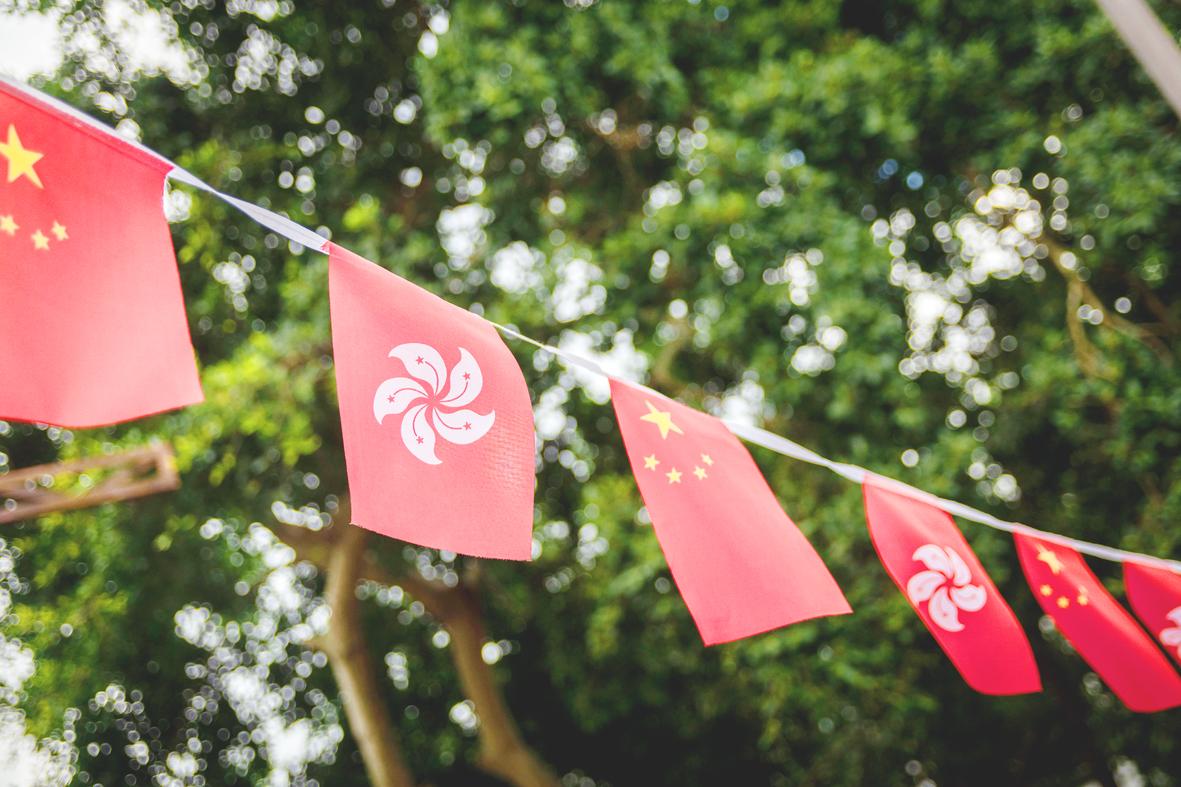Academics yesterday urged “professional assessment” by the government in response to calls to close the nation’s representative office in Hong Kong.
Taiwanese officials in Hong Kong have been told that their visas would not be renewed if they do not sign a document supporting Beijing’s claim to Taiwan under its “one China” principle, sources have said.
Several officials at Taiwan’s de facto Hong Kong consulate who were due to renew their visas have been asked by the Hong Kong government to sign the document, Reuters on Friday quoted a senior Taiwanese official with knowledge of the matter as saying.

Photo: Bloomberg
The media reports prompted increasing calls from Taiwanese online for the government to take a tough stance by closing its Hong Kong office.
National Chengchi University professor Lee Yeau-tarn (李酉潭), a researcher who specializes in politics and human rights, yesterday said that such a move would put Taiwanese working and studying in the territory at a disadvantage.
According to government estimates, 69,000 people hold both Taiwanese and Hong Kong residency, while about 5,700 Taiwanese working or studying in Hong Kong have only Taiwanese residency.
There are 11 Taiwanese officials at the representative office — which remains open — whose visas will expire in the next year or two, Lee said, adding that the government should seek to ensure that the office remains open afterward.
With international attention focused on Hong Kong, Taiwan should seek to cooperate with like-minded nations in its relations with the territory, he added.
Academia Sinica’s Institute of Taiwan History associate research fellow Wu Rwei-ren (吳叡人) echoed the sentiment, saying that closing the office would serve no strategic purpose.
“It is better to stick around until they force you out at the last minute,” he said, adding that this would highlight Beijing’s bullying for the world to see.
The requirement to sign a “one China” promise is not stipulated in Beijing’s new national security legislation for Hong Kong, he said.
The requirement was in the spirit of that law, but was not a new move by Beijing, Wu said, citing Mainland Affairs Council Macau Affairs Department Director Lu Chang-shui’s (盧長水) refusal to sign a similar document two years ago, preventing him from taking the post of representative to Hong Kong.
The Hong Kong government appeared to be putting the weight of the security legislation behind the requirement with the intention of crippling the Taiwan office’s operations, Wu said, adding that the move aims to cut off cooperation between Hong Kong and Taiwan “separatists.”
Beijing’s plan is to have the Taiwan office reduced to minimal staff so that it could do nothing more than issue visas, he said.
Taiwan’s current policies over Hong Kong and Macau will likely become unusable in the future, so the government must be proactive in designing new policies, Wu said.

AIR SUPPORT: The Ministry of National Defense thanked the US for the delivery, adding that it was an indicator of the White House’s commitment to the Taiwan Relations Act Deputy Minister of National Defense Po Horng-huei (柏鴻輝) and Representative to the US Alexander Yui on Friday attended a delivery ceremony for the first of Taiwan’s long-awaited 66 F-16C/D Block 70 jets at a Lockheed Martin Corp factory in Greenville, South Carolina. “We are so proud to be the global home of the F-16 and to support Taiwan’s air defense capabilities,” US Representative William Timmons wrote on X, alongside a photograph of Taiwanese and US officials at the event. The F-16C/D Block 70 jets Taiwan ordered have the same capabilities as aircraft that had been upgraded to F-16Vs. The batch of Lockheed Martin

US President Donald Trump yesterday announced sweeping "reciprocal tariffs" on US trading partners, including a 32 percent tax on goods from Taiwan that is set to take effect on Wednesday. At a Rose Garden event, Trump declared a 10 percent baseline tax on imports from all countries, with the White House saying it would take effect on Saturday. Countries with larger trade surpluses with the US would face higher duties beginning on Wednesday, including Taiwan (32 percent), China (34 percent), Japan (24 percent), South Korea (25 percent), Vietnam (46 percent) and Thailand (36 percent). Canada and Mexico, the two largest US trading

GRIDLOCK: The National Fire Agency’s Special Search and Rescue team is on standby to travel to the countries to help out with the rescue effort A powerful earthquake rocked Myanmar and neighboring Thailand yesterday, killing at least three people in Bangkok and burying dozens when a high-rise building under construction collapsed. Footage shared on social media from Myanmar’s second-largest city showed widespread destruction, raising fears that many were trapped under the rubble or killed. The magnitude 7.7 earthquake, with an epicenter near Mandalay in Myanmar, struck at midday and was followed by a strong magnitude 6.4 aftershock. The extent of death, injury and destruction — especially in Myanmar, which is embroiled in a civil war and where information is tightly controlled at the best of times —

China's military today said it began joint army, navy and rocket force exercises around Taiwan to "serve as a stern warning and powerful deterrent against Taiwanese independence," calling President William Lai (賴清德) a "parasite." The exercises come after Lai called Beijing a "foreign hostile force" last month. More than 10 Chinese military ships approached close to Taiwan's 24 nautical mile (44.4km) contiguous zone this morning and Taiwan sent its own warships to respond, two senior Taiwanese officials said. Taiwan has not yet detected any live fire by the Chinese military so far, one of the officials said. The drills took place after US Secretary